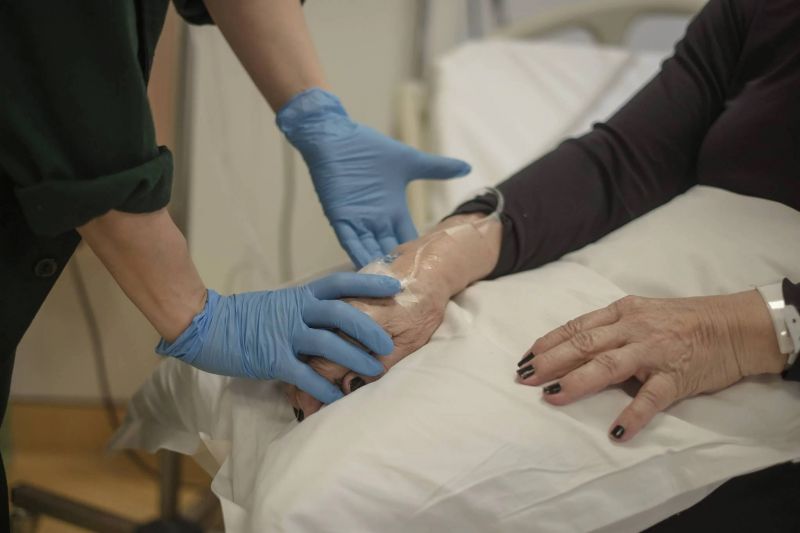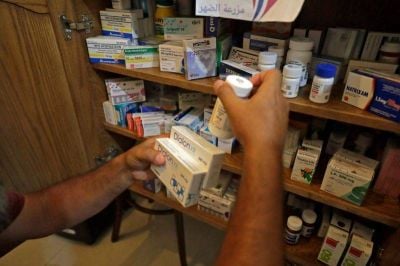
A patient receives care at a Beirut hospital. (Credit: João Sousa/L'Orient Today/File photo)
For the past several days, whenever Mohammad Tarha’s phone rings, he scans all calls from a private hospital in Saida, where his mother has been bedridden for nearly two weeks.
“They’re asking me to pay the bill,” he explains over the phone.
Tarha, who is in his 20s, has been unemployed for a year.
Seven months ago, his mother was diagnosed with spinal cord cancer. Since then, his family has been making every effort to cover the costs of treatment and hospitalization but is struggling to keep up.
“We’ve already spent over $35,000,” Tarha says. “We’ve sold everything we had: an apartment, two cars and even the engine of a scooter.”
“I might end up selling my organs if this continues,” he says.
Tarha tried everything, including making a direct appeal to the Health Ministry in a video posted on Facebook.
“I don’t want to beg,” he says. “I simply want the cancer treatment to be covered.”
The Health Ministry’s media office did not respond to L’Orient-Le Jour’s requests for comment.
Since the onset of the country’s economic and financial collapse in late 2019, the Lebanese people have been grappling with a dual challenge: witnessing their loved ones falling ill and being unable to afford the resulting medical expenses.
“Prior to the crisis, patients covered by the National Social Security Fund (NSSF) used to pay 10 percent of their medical bills,” says Sleiman Haroun, the head of the private hospitals’ union, representing over 85 percent of the country’s available hospital beds. “Those covered by the Health Ministry used to pay 15 percent of their treatment.”
“However, due to the devaluation of the Lebanese lira and the subsequent readjustment of billing structures, patients now find themselves bearing the burden of nearly 70 percent of the total medical costs,” Haroun adds.“In 2018, hospitals conducted 2,800 surgeries,” he says. “Today, if a surgical procedure is not deemed vital, patients often forego it due to financial constraints.”
“Since 2020, insurance companies have seen a 30 percent decline in the value of their medical premium portfolios, billed in fresh dollars,” says Assaad Mirza, president of the Association of Insurance Companies in Lebanon. He specifically points to the repercussions of illegal banking restrictions imposed since 2019 and the disappearance of credit.
Meanwhile, family members, especially those residing abroad with access to foreign currency, often become the primary sources of financial support.
‘I’ve never had to ask for help before’
“I don’t have anyone abroad,” said Yasmine Moussalli, a Tripoli mother in her 30s who has become her son’s primary caregiver.
Her 10-year-old son, Issa Abdo, has seen his health steadily deteriorating over the past four years.
Moussalli consulted numerous doctors, but it took three long years to receive a diagnosis: her son was suffering from dystonia, a central nervous system dysfunction that leads to prolonged, involuntary muscle contractions in one or more parts of the body.
“It’s as if he’s turned to wood,” she says. While initially hopeful about the medication prescribed by the doctor for a potential return to a “normal life,” surgery ultimately became the only option.
However, the treatment comes with a staggering price tag, exceeding $60,000. For Moussalli, a mother of two other children and married to an electrician, this amount is utterly out of reach. She left no stone unturned in her quest to raise the funds but found no success.
“It’s incredibly disheartening,” she says. Her next step involves seeking assistance from politicians, in a country where patronage and clientelism are prevalent.
“But I was told that they no longer offer help as they used to,” Moussalli added. Some even suggested that she should go on TV to plead her case, “but even that requires ‘wasta' [connections].”
“The most agonizing part is knowing that there is a cure available, but not having the means to acquire it,” she says.
In the face of this dire situation, various associations are taking the lead.
One such organization is the LibanTroc, an NGO founded in 2019, which receives more than 20 requests for life-saving operations daily, totaling over $5,000 in assistance, as explained by its founder and president, Hala Dahrouge.
Élia, a 60-year-old tiler, is among those who received support from LibanTroc, which helped raise $2,081 to cover the costs of radiotherapy for his wife, diagnosed with cancer just two months ago.
He recalls his initial struggle to reach the association. “I had never asked for help before.”
He had already paid more than $8,000 for the necessary tests and a biopsy: half from his own pocket and the remainder from friends and family.
“Before the crisis, we didn’t need external assistance; we had insurance,” says Élia, who feels now compelled to continue working at his age.
‘We felt like we had to beg’
Despite the efforts of associations to adjust to the increasing demand, resources are not always readily available. “Lebanese people are largely left to fend for themselves,” says Dahrouge. “We often feel like we’re trying to quench a desert's thirst with just a cup of water.”
When all other options have been exhausted or the required sum is simply unattainable, there is one last resort: crowdfunding.
Matteo al-Khodr, a Greek-Lebanese opera singer, found himself with no other choice but to turn to specialized crowdfunding platforms such as GoFundMe and Fund a Hope.
He reached out to strangers, seeking donations totaling $60,000 to cover the treatment and hospitalization expenses for his father, who was suffering from a rare form of bone marrow leukemia.
“We were once quite well-off, but our funds are now locked up in banks,” Khodr explains, noting that he faced no issues in financing his mother's cancer treatment before the crisis.
“We felt like we had to beg," says Wassim al-Khodr, Matteo’s father, who is a university professor and underwent surgery on July 18.
When Khodr launched the crowdfunding campaign online, he experienced a sense of discomfort.
“I initially didn’t want anyone to see it, but my friends reassured me that many were in a similar situation,” Khodr says. “After all, the most important thing was that we could save Dad.”
This article was originally published in French in L'Orient-Le Jour. Translation by Joelle El Khoury.
